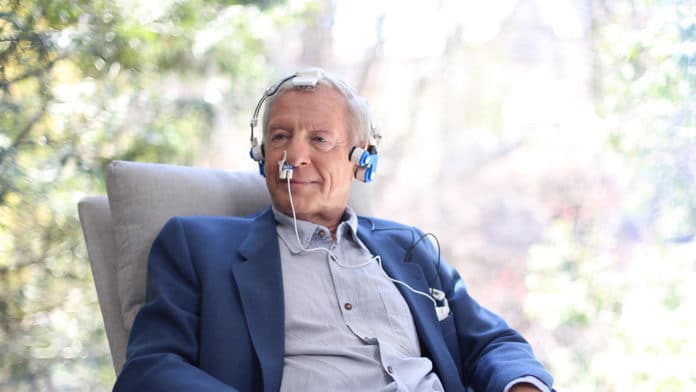A Canadian biotechnology company has been able to devise a new headset that will bring a medical and therapeutic breakthrough for Alzheimer’s patients, as it can work to restore memory to patients. Scientists believe that shining light directly into the brain areas damaged in Alzheimer’s through the nose and skull can reverse the disease.
The new device, called the Neuro RX Gamma headset, being tested was developed by Vielight, a leader in brain photobiomodulation (PBM) technology. The headset equipped with LEDs is based on Vielight’s proprietary PBM technology.
The Neuro RX Gamma is non-invasive, delivers near-infrared energy, pulsing at the gamma rate of 40Hz, to the region responsible for memory in the brain in daily treatment sessions. It has been designed to be suitable for home-use.
The infrared light is delivered through four diodes positioned over the scalp and one positioned inside the nostril. It transmits the waves through the skull and through the nostrils, using a separate nasal clip. The light enhances the mitochondria that supply cells with energy through a process called photobiomodulation and stimulates the brain to activate immune cells known as microglia that fight disease and try to get rid of it.
The innovation was announced after the first major trial to see its effectiveness, and the headset improved writing and reading skills, restored memory, improved sleep rates, anxiety, and stress, reduced tantrums, and raised cognitive development.
Initial experiments have shown the ability of these headsets to reverse the symptoms of Alzheimer’s disease, get rid of toxic proteins accumulated in brain cells, and enhance the cells responsible for memory.
If successful, the technology would be the first to actually reverse the disease. This clinical trial is timely against the backdrop of many unsuccessful attempts by pharmaceutical and device companies to demonstrate acceptable efficacy and safety to address the disease. At present, patients need to rely on drugs that only managed to slow the onset of dementia.
“Photobiomodulation introduces the therapeutic effect of light into our brain,” Dr. Lew Lim, the CEO of Vielight and inventor of the device, told The Telegraph. “It triggers the body to restore its natural balance or homeostasis. When we do that, we call upon the body’s innate ability to heal.”
